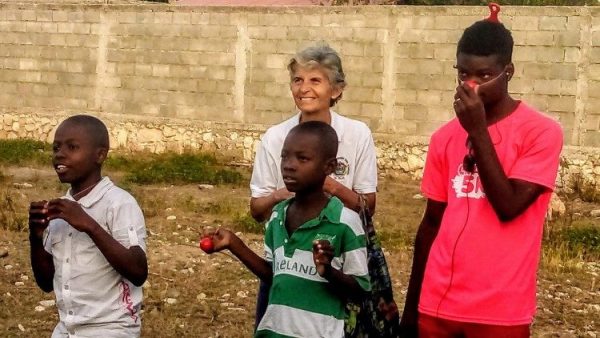Bishop hails Sr. Luisa’s service to the poor and Church in Haiti
 As Haitians hold a procession in honor of Sr. Luisa Dell’Orto who was killed in an armed attack in Port-au-Prince on Saturday, Bishop Pierre-André Dumas of Anse-à-Veau and Miragoâne diocese upholds the late nun’s work as a point of reference for the Church in Haiti.
As Haitians hold a procession in honor of Sr. Luisa Dell’Orto who was killed in an armed attack in Port-au-Prince on Saturday, Bishop Pierre-André Dumas of Anse-à-Veau and Miragoâne diocese upholds the late nun’s work as a point of reference for the Church in Haiti.
Sr. Luisa Dell’Orto, a Little Sister of the Gospel of Charles de Foucauld, was killed on Saturday in Haiti, after falling victim to an armed attack during which she was critically injured. She was rushed to the hospital where she died shortly after.
The 64-year-old nun, originally from Lomagna, in Italy’s Lecco district, had lived in Haiti for twenty years, dedicating her life to the service of the poor and street children.
Pope Francis praised her service during his Angelus on Sunday, saying that she “made her life a gift to others, even to the point of martyrdom” as he offered his condolences to her family and religious community.
Procession in honor of Sr. Luisa
In the wake of the tragic death of the nun, a crowd of Haitians from the neighbourhood where she lived held a procession on Wednesday to the site of the armed attack that led to her death in Port-au-Prince, the Haitian capital.
Sister Luisa died just two days shy of turning 65 years, and the crowd that gathered in her honor, made sure to remember her birthday.
On Thursday afternoon, a Mass will be celebrated in her parish, with the presence of her earthly remains.
Her home parish in Lomagna, Lecco, in Italy, also gathered for the recital of the Rosary on Monday, led by Archbishop Mario Delpini of Milan.
Not afraid to serve
In an interview with Vatican News' Federico Piana, the Bishop of the Haitian Anse-à-Veau and Miragoâne diocese, Bishop Pierre-André Dumas, remembered the nun for her courageous service, even in dangerous neighbourhoods.
The Bishop recalled that Sr. Luisa worked in a “difficult and violent area in the outskirts of the capital, Port-au -Prince” – an area that the Church had indicated to have high levels of violence. Yet, he continued, “Sister Luisa was not afraid to go to the most infamous slum to bring to concrete help to everyone.”
Service to the poor and the Church
Sr. Luisa’s work with the poor made her popular in the neighbourhood. She was the backbone of “Charles House”, which provides shelter for street children in the impoverished slums of the Haitian capital.
The nun was also well integrated into the diocese and the Church in Haiti. She taught philosophy at the diocese’s Notre Dame Seminary and at the Salesian Center for Higher Education (CESADES).
Bishop Dumas said that Sr. Luisa’s work strengthened the Church in Haiti. First, he explained, “she worked very well on the education of young children, creating, for example, dance classes and bringing out the hidden aptitudes of children and young people, enhancing them with professionalism.”
Secondly, the Bishop added, “She empathized with the poor. For our local Church she became a point of reference also because hers was an existence lived in martyrdom: a discreet person who made no noise but embodied the true values of the Gospel. We could also appreciate all this when she was a formator at the major seminary, an excellent job that lasted more than twenty years."
Maddalena Boschetti, a lay fidei donum missionary in Haiti for almost 20 years, also remembered Sr. Luisa for her service to the poor.
“She was one of the friends who accompanied me the most, helped me during these years," said Boschetti. “A missionary friend, chosen by the Lord who called her and asked her to live, not just to die, but to live for her poor, for the neediest people in this country."
Insecurity and social instability in Haiti
Though the motive for the killing of Sr. Luisa is unclear, Haiti, one of the countries with the most severe poverty levels in the Western hemisphere, has had challenges with insecurity and social instability. The devastating earthquakes in 2010 and 2021 have also dealt a huge blow to the country’s economic health.
Bishop Dumas explained the situation on the ground, noting that there “is a chronic lack of basic necessities and a climate of social instability that Haiti has been experiencing for a long time.” He added that clashes between clans have also worsened the situation of insecurity to boot and kidnappings and murders “occur with worrying frequency.”
In the face of this, the Bishop said that the Church has been channeling efforts towards establishing peace among the factions in conflict.
"For too long," said Monsignor Dumas, "the Haitian people have been suffering; we need to give them a real chance for redemption. There are some signs of hope on the horizon: many are realizing that this is not the way forward. Those who have responsibilities must be able to find solutions, while also listening to the advice of the Church."
Benedict Mayaki
Source: vaticannews.va

